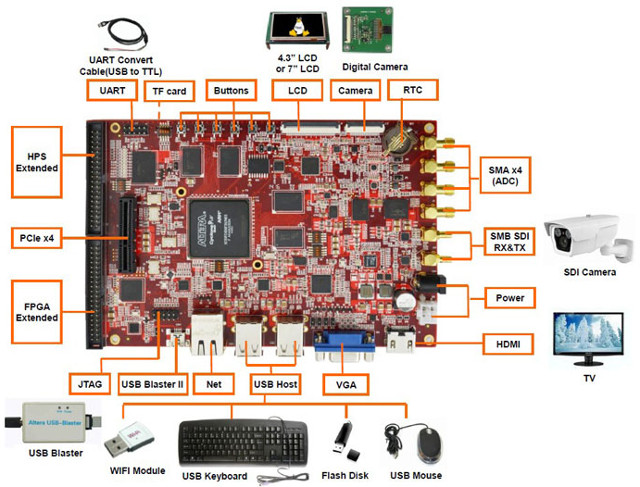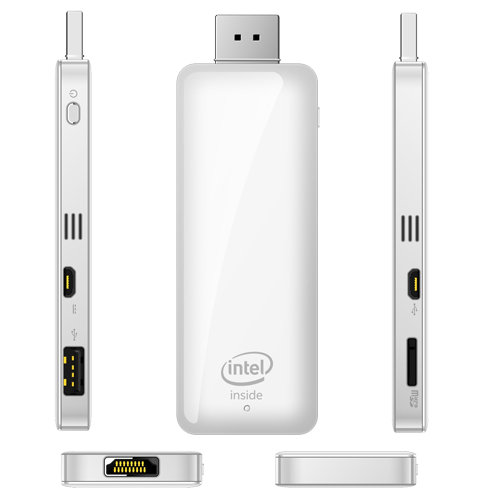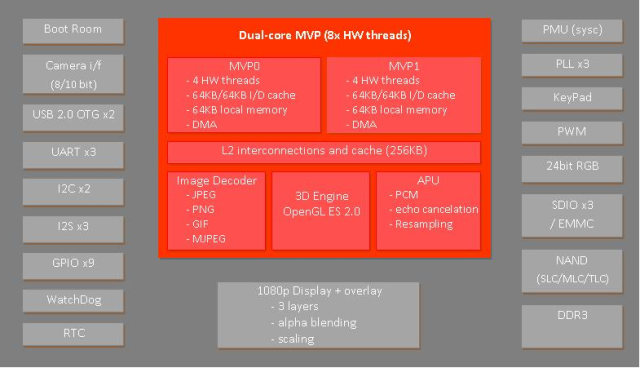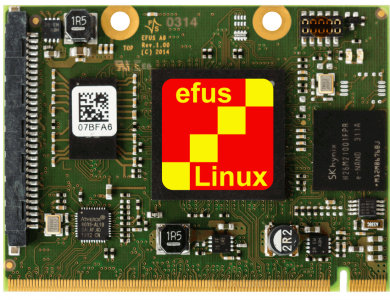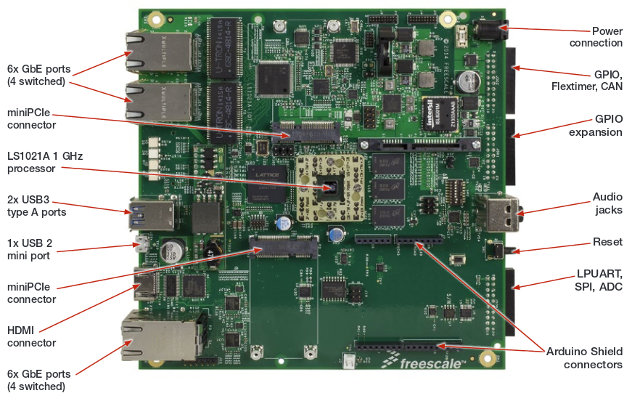Farnell/Element14 has quietly announced Lark Board from their subsidiary Embest Technology in September. The board is powered by an Altera Cyclone V ARM Cortex-A9 dual-core + FPGA processor with high speed transceivers, runs Debian 7.4, and targets medical instruments, video surveillance and industrial control applications. Lark board specifications: SoC – Altera Cyclone V SX (5CSXFC6D6F31I7N) with a dual core Cortex A9 processor (HPS – Hard Processor System) @ 800 MHz, FPGA fabric including up to 110K logic cells (LE), and high speed transceivers (2 PCIe hard IPs and 9 3Gbps transceivers) System Memory – 1GB DDR3 SDRAM for HPS, 1GB DDR3 SDRAM for FPGA Storage – 4GB eMMC Flash + micro SD card slot Audio/Video Interfaces – HDMI, VGA, and 24-bit LCD interface supporting 4-wire touch screen Data Transfer Interfaces: High-resolution serial digital interface (SDI) that supports SMD standard interface and provides a SDI TX and a SDI RX 12-bit […]
MEEGO-T01 HDMI TV Stick Supports Android, Windows 8.1, and Ubuntu/Linux
ARM based HDMI TV dongles have been available for over two years, mostly running Android, but the community has managed to install Linux desktop operating systems such as Ubuntu or Debian on these tiny gadgets with some limitations. But now that Intel is making low power SoC for tablets, at least one company has decided to make an HDMI TV stick powered by Intel “Bay Trail-T” Z3735F/G quad core processor, which can run Android, Windows 8.1, and Linux based desktop operating systems such as Ubuntu. Meegopad MEEGO-T01 (aka APM-D01?) hardware specifications: SoC – Intel Atom Z3735F / Z3735G “Bay Trail” quad core processor @ 1.33 GHz (Bust freq: 1.83 GHz) with Intel HD graphics (2W TDP) System Memory 1 GB DDR3L-1333 for Z3735G (32-bit up to 5.3 GB/s) 2 GB DDR3L-1333 for Z3735F (64-bit up to 10.6 GB/s) Storage – 16 or 32 GB eMMC + micro SD slot Video […]
ICube MVP SoCs Combine CPU and GPU into a Single Unified Processing Unit (UPU)
ICube is a fabless semiconductor company developing SoCs featuring a Unified Processing Unit (UPU) that takes care of the tasks usually handle by separate CPU and GPU on typical SoCs. The UPUs are based on MVP (Multi-thread Virtual Pipeline) instruction set architecture, and are themselves called MVP cores. The company has now two SoCs based on UPU MVP cores: IC3128 and IC3228. IC3128 is a single core / 4 thread SoC, and IC3228 is a dual MVP core / 8 threads SoC. Let’s have a look at IC3228 technical specifications: CPU function 4-way simultaneous multi-threading (SMT) in each core Symmetric-multi-processing (SMP), dual MVP cores 64KB I-cache, 64KB D-cache and 64KB local memory in each core, 256KB shared L2 cache Homogeneous parallel programs Support Pthread, OpenMP GPU function Data parallel, Task parallel, and/or Function parallel computing Multi-standard media processor Programmable unified shader Support OpenGL ES 2.0 70 million triangles / sec, […]
ZSun Wireless USB Flash Drives Add up to 32GB to Your Mobile Device
Yesterday, I wrote about the Egg personal cloud storage device which allows you to easily store and share your files without having to rely on cloud services, and also includes a touchscreen display. But it might be possible to achieve the main selling point of that product, that is keeping your data private, while accessing it from anywhere, at a fraction of the cost, by using a Wireless USB flash drive instead. Some well known companies such as Kingston (rather expensive), and Sandisk (much more affordable) already offer such products, but I’ve been informed Zsun, a Chinese company, was also manufacturing such devices with up to 32 GB capacity. The company calls its wireless flash drive “Apple Disks” showing how much money you could save with their device, by showing the ridiculous price different between apple devices with difference storage capacity, but they can also work with Android devices, as […]
Linux 3.17 Released
Linus Torvalds announced the release of Linux Kernel 3.17 on Sunday: So the past week was fairly calm, and so I have no qualms about releasing 3.17 on the normal schedule (as opposed to the optimistic “maybe I can release it one week early” schedule that was not to be). However, I now have travel coming up – something I hoped to avoid when I was hoping for releasing early. Which means that while 3.17 is out, I’m not going to be merging stuff very actively next week, and the week after that is LinuxCon EU… What that means is that depending on how you want to see it, the 3.18 merge window will either be three weeks, or alternatively just have a rather slow start. I don’t mind getting pull requests starting now (in fact, I have a couple already pending in my inbox), but I likely won’t start processing […]
Cortus Introduces APS23 and APS25 32-Bit Cores for Micro-controllers
ARM and MIPS are not the only games in town with it comes to 32-bit cores for micro-controllers. I’ve already written about Beyond Semiconductor, and mentioned Andes used in some Wi-Fi SoC, and today I’ve come across another IP company called Cortus. which just introduced APS23 and APS25 cores based on their latest Cortus V2 instruction set. which offers a smaller code footprint compared to there V1 ISA. APS23 can achieve 1.44 Coremarks/MHz, 2.83 DMIPS/MHz, and can run up to 200 MHz when manufactured with 90nm process, whereas APS25 is a bit more powerful with 2.09 Coremarks/MHz, 2.36 DMIPS/MHz, and can run up to 344 MHz. Minimal power consumption is 11.6 and 19.3 uW/Mhz for APS23 and APS25 respectively. Key features of both cores include: APS23 APS25 Excellent Code Density 3 stage pipeline 5-7 Stage Pipeline Sequential Multiplier High Performance Integer Multiply Optional Parallel Multiplier (Gives 2.62 Coremakes/MHz) Integer Divider Full Peripheral Set Dual […]
F&S Elektronik Systeme Introduces eFus A9 Industrial Computer Modules Powered by Freescale i.MX6 SoC
F&S Elektronik Systeme, a German embedded systems company, has announced their efus A9 Computers-on-Module (CoM) based on Freescale i.MX6, are now in mass production. The CPU comes in two variants A9V2 for i.MX6 Solo, and A9V3 with i.MX6 DualLite, both of which are certified for automotive and industrial applications, and support commercial, extended, and industrial temperature ranges. eFuse A9 computer-on-module specifications: SoC – CPU Freescale i.MX6 Solo (eFus A9V2) or DualLite (eFus A9V3) @ up to 1.2 GHz + Vivante 2D and 3D GPUs System Memory – 512MB (Up to 1GB RAM) Storage – 256 MB NAND flash (Up to 1GB), 2 GB eMMC (eFus A9V3 only. up to 32GB), optional SPI NOR, optional I2C EEPROM Display I/F – 18-bit RGB, 2x 24-bit LVDS, and DVI Other interfaces available via 230 pins MXM-2 edge connector: 2x SD card I/F 1x Gigabit Ethernet 1x USB Host, 1x USB Device 2x CAN […]
Freescale LS1021A-IOT IoT Gateway Reference Design Powered by QorIQ LS1021A Dual ARM Cortex A7 SoC
Freescale has just launched a an IoT gateway reference design powered by their QorIQ LS1021A communication processors running Linux/OpenWRT, designed in partnership with TechNexion, and targeting various IoT applications such as building/home management, smart cities, networked industrial services, etc… Beside the dual core Cortex A7 QoirIQ processor, the board features six Gigabit Ethernet ports, two USB 3.0 ports, a SATA 3 port, two mini PCIe connector, an LVDS interface, HDMI output, Arduino UNO compatible headers, and various others expansions headers. LS1021A-IOT IoT gateway Specifications: SoC – Freescale QorIQ LS1021A dual core Cortex A7 communication processor @ 1 GHz (5,000 coremarks) MCU – Freescale Kinetis K20 Cortex M micro-controller System Memory – 1 GB DDR3L Storage – 1 Gb QSPI NOR Flash, SDHC slot (up to 32 GB) populated with a 4GB SD card, 1x mSATA 3 slot Connectivity – 6x Gigabit ports via SGMII (Serial Gigabit Media Independent Interface) and […]


